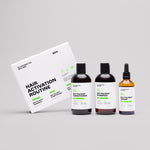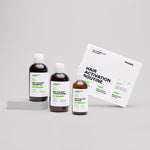Hair loss is a common concern that affects both men and women, leading many to wonder about the underlying causes. While genetics and hormonal changes often play a significant role, nutritional deficiencies are also a key factor that can lead to hair thinning and loss. Understanding which deficiencies are linked to hair loss can help individuals take steps to address the issue, potentially reversing the effects through diet and supplementation. In this comprehensive guide, we'll explore the specific nutritional deficiencies that can cause hair loss, offering insights into how you can maintain a healthy mane through proper nutrition.
Table of content
What Deficiency Causes Hair Loss?
The primary deficiencies that can lead to hair loss include iron, zinc, vitamin D, vitamin B12, and protein. A lack of these essential nutrients can disrupt the hair growth cycle, leading to increased hair shedding and reduced hair regrowth.
Iron Deficiency
Iron plays a crucial role in the production of hemoglobin, which helps carry oxygen to cells, including those responsible for hair growth. An iron deficiency can lead to anemia, a condition characterized by insufficient oxygen reaching the hair follicles, which can interrupt the hair growth cycle and lead to hair loss.
Zinc Deficiency
Zinc is vital for tissue growth and repair, including hair growth. It also helps keep the oil glands around the follicles working properly. Zinc deficiency can result in hair loss because it can lead to a deterioration of the protein structure that makes up the hair follicle, weakening the hair and making it more prone to breakage.
Vitamin D Deficiency
Vitamin D is involved in the creation of new hair follicles where new hair can grow. A deficiency in vitamin D has been linked to alopecia, a technical term for hair loss. Vitamin D's role in stimulating hair follicles and helping cells process keratin, a protein crucial for hair health, means that a deficiency can significantly impact hair growth.
Vitamin B12 Deficiency
Vitamin B12 is essential for healthy red blood cell formation, which carries oxygen to tissues, including hair follicles. A deficiency in vitamin B12 can lead to hair loss as the hair follicles can become deprived of oxygen, affecting the hair growth cycle.
Protein Deficiency
Protein is the building block of hair, as hair is primarily made of a protein called keratin. A diet lacking in adequate protein can lead to hair loss as the body may ration protein by shutting down hair growth.
Addressing Nutritional Deficiencies
Correcting these deficiencies can often lead to improvements in hair health and a reduction in hair loss. This can be achieved through dietary changes and, in some cases, supplementation under the guidance of a healthcare professional. Here are some dietary sources rich in the nutrients mentioned:
- Iron: Red meat, spinach, lentils, and fortified cereals.
- Zinc: Oysters, beef, pumpkin seeds, and lentils.
- Vitamin D: Fatty fish, egg yolks, fortified foods, and sunlight exposure.
- Vitamin B12: Animal products, including meat, dairy, and eggs, or supplements for those on a vegan diet.
- Protein: Meat, fish, eggs, dairy products, legumes, and nuts.
Conclusion
Understanding the link between nutritional deficiencies and hair loss is crucial for addressing this common concern. Iron, zinc, vitamin D, vitamin B12, and protein deficiencies can all disrupt the hair growth cycle, leading to hair loss. By identifying and correcting these deficiencies through diet or supplementation, individuals can take significant steps towards improving their hair health. However, it's important to consult with a healthcare provider before starting any new supplement regimen, especially if you suspect that a deficiency is contributing to hair loss.
FAQs
Can hair loss from nutritional deficiencies be reversed?
Yes, if hair loss is solely due to a nutritional deficiency, correcting the deficiency through diet or supplementation can help reverse hair loss and promote new growth, provided there is no underlying condition that also affects hair health.
How long does it take to see improvements in hair growth after addressing a deficiency?
Improvements in hair growth can take several months to become noticeable. Hair grows about half an inch per month, and the body may need time to correct a deficiency before hair growth resumes normally.
Should I take supplements to prevent hair loss?
Supplementation should be considered if you're unable to meet your nutritional needs through diet alone. However, it's essential to consult with a healthcare provider to determine the right supplements and dosage for your specific needs to avoid over-supplementation, which can also negatively impact hair health.
Addressing nutritional deficiencies is a proactive step towards maintaining healthy hair growth. By ensuring your diet includes adequate amounts of iron, zinc, vitamin D, vitamin B12, and protein, you can support your hair health and reduce the risk of hair loss related to nutritional deficiencies.
Unlock the Power of Scandinavian Biolabs for a Healthier, Fuller Head of Hair
At Scandinavian Biolabs, we believe that everyone deserves to feel confident and beautiful in their own hair. That's why we've dedicated ourselves to developing cutting-edge formulations against hair thinning that are safe, effective, and backed by science.
Our revolutionary products are designed to combat your hair loss concerns. With Scandinavian Biolabs, you can finally say goodbye to hair loss and embrace a healthier, fuller head of hair.
Don't let hair loss hold you back any longer. Experience the Scandinavian Biolabs difference and unlock the potential of your hair's natural beauty.
Read more:
- 13 Best Hair Loss Serums For Men In 2024
- 7 Best Shampoos For Thinning Hair Due To Menopause That Works
- 19 Best & Proven Shampoos For Hair Thinning In 2024
As your leading source for hair health information over the past 4 years, we never compromise on accuracy. When it comes to your health, you deserve information you can truly rely on - and earning your trust is our top priority.
Here's how Scandinavian Biolabs ensures every piece of content meets the highest standards of accuracy and integrity:
- Credentialed Experts: Our reviewers are actively practicing doctors and medical researchers
- Stringent Reviews: Content undergoes rigorous editing by subject specialists and review by a practicing doctor.
- Evidence-Based: We rely on well-established research from trusted scientific sources like peer-reviewed journals and health authorities.
- Full Transparency: Our editorial standards, writer credentials, reviewer credentials, correction process, and funding are all publicly documented.
- Independent Voice: While we do promote products, we operate in a vacuum to business operations. Our main goal is just an unwavering commitment to providing medically-sound guidance.
You can count on Scandinavian Biolabs to consistently deliver the trustworthy health information you deserve. Read our Editorial Standards.







